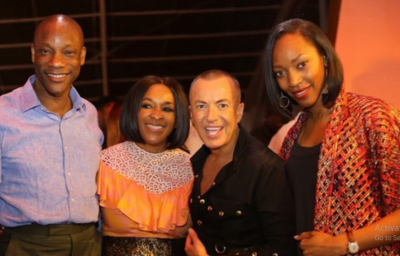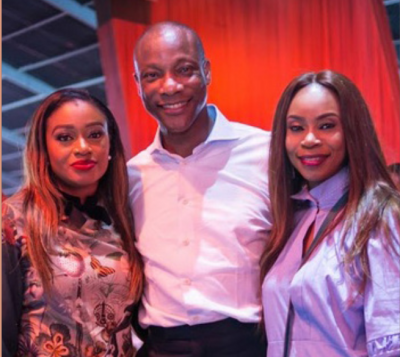Having made inroads into the food and drink industry with its GT Bank Food and Drink Weekend, a food exhibition and sales event aimed at projecting th
Having made inroads into the food and drink industry with its GT Bank Food and Drink Weekend, a food exhibition and sales event aimed at projecting the diverse angles of the food industry, the bank under the leadership of Segun Agbaje decided to take on another industry, the fashion industry via the GT Bank Fashion Weekend. In its second year, the two-day consumer focused event which ended about two weeks ago, created an ultimate fashion experience where the most promising and talented retail brands showcased the latest fashion trends and products to a large and diverse audience of consumers, fashion aficionados and industry professionals. Judging by how well the fashion event has been received these past two years, it is obvious the bank is set to leave an extensive footprint in the fashion industry. In this interview with the Lifestyle/Editorial Director, Nkarenyi Ukonu, 53 year old Segun Agbaje, talks more on the bank’s vision for the evolving fashion industry as well as what makes him tick.
GT Bank has had a long history of supporting the local fashion industry, having being a part of the country’s two leading fashion events; The ARISE fashion week and The Lagos Fashion and Design Week. What is responsible for the bank now going the whole hog?
It was very important for us to have this platform. What we are trying to do is build Small Medium Enterprises. If you look at the rest of the world, say a country like Italy for example, SMEs control their economy. In Nigeria, the biggest businesses are the SMEs which is why we decided to be associated with SMEs. However, seeing that SME is a general thing, we choose to pick certain industries to support which we think are quite popular and have a lot of Nigerians doing amazing things, one of which is the fashion industry. The reason we don’t call it a fashion show but a fashion weekend is because it is more than just about fashion. We had the master class and what we did was to bring in nine people who are doing great in the fashion and beauty world internationally and had them give small businesses, capacity. I am one of those people who believe that nothing comes easy and if you have learned from the people who have done it before, the things they have done successfully, the mistakes they have made, one can create one’s own path to success. Then there were the retailers. I think that in Nigeria, until we can grow the SME sector as a country, we really will not attain our full potential. So what we tried to do in our own little way was to pick about 90 retailers, give them a platform, provide structures and everything for them for free. All they had to do was just come and sell their wares and services. Even if they didn’t sell for the two days, hopefully people saw them, people now know who they are, and they can always do a follow up and hopefully it will increase their profitability. The bank has on its own exposed them. Then of course there was the runway shows which excited a lot of fashion enthusiats. Again, we exposed Nigerians to the best designers there are; we give them African designers, some international designers and some local designers who have shown incredible talents and who we think we can give a platform to help them go international. It was all about promoting enterprise and to also help to position Nigeria positively to the outside world.

Segun Agabje with his wife, Derin, Welsh fashion designer, Julian McDonald and GQ Style publisher, Vanessa Kingori
Beyond the fashion weekend, how does the bank’s involvement help the fashion industry in the long run?
The ultimate goal is to create infrastructure that they can share. It is very challenging but hopefully we can make it happen. Our dream is to put together something, like a hub, where they can do stuffs with textile designs together. It’s called contract sharing. You know, build a factory that makes say shirts, trousers, ties etc. They get them ready for you in about three, four hours and you put your own label on it. That is what happens everywhere in the world. The person who makes one particular kind of shirt, does another and all they do is change the label. Same factory. It allows for economy of scale and allows you to operate bigger because you don’t have over head cost. It is not easy but we have the blue print, we have the numbers. What is challenging is trying to find the equity that will go into it because for this kind of thing, it isn’t overnight money. So we have to find some very stable long term equity and not just to create this platform for two days, but to create a lasting work that people can use.
Don’t you think that some of the things taught at the master classes may not be applicable in our environment especially because the people flown in for the master classes have not experienced the peculiarity of operating here?
I hate to disagree with you but I think success is success wherever you are in the world. Nigeria has its own challenges, the developing economies have their own challenges. Once you are able to tell a person what it is that has made you successful, the failures you have had, how you have overcome them, irrespective of our own local challenges, those tips if well applied will make your own journey to be successful. There is really nothing unique about problems; you have problems, I have problems, we have challenges and I don’t personally look at them as challenges anymore but an opportunity to learn which is what we tried to do. So I suggest we take our challenges and just use it as an opportunity to learn. I sat in some of the master classes and I think that a load of things that people were told there are universal to what makes one successful.
Between last year when GT Bank Fashion Weekend made its debut and this year, would you say the banks aspirations have been met?
I would say it is a continuous process but I would hope that with the thousands of people who made it there, it means that we exposed the bank to them all. Through that platform, we have exposed the brand to as many people as possible in one way or the other. Everything we did on social media has exposed and will hopefully reinforce the brand positively. I am not one of those people who believe that ideas and visions should come down on return on investment, because then you will never get anything done. I think one has to take the bull by the horn, one has to have gut instincts that it is going to work. My personal view is that we have enhanced the brand positively and exposed the bank positively by coming into the fashion industry.

Segun Agbaje with Nigerian fashion designer, Lanre Da Silva Ajayi and socialite, Deola Bali
Are there plans to hold the fashion weekend outside Lagos?
A lot of people are beginning to ask if we would do Abuja and Port Harcourt but the logistics that goes into this is not that easy and in any year where we choose to do it outside of Lagos, we may not be able to do Lagos. So it is something we would have to think about. I am not sure we have the capacity to do this in more than one location in the country once a year.
Are you planning on expanding your frontiers and take on other sectors of the economy?
We don’t have enough money, enough people and enough energy to do so. We would stay with these two; GT Bank Food and Drink Weekend and the GT Bank Fashion Weekend. We would try to make these two as big and as successful as possible. I am also of the school of thought that you can’t do too many things and do them well. And for us, we can only do two things well at the standard with which we would like to do them. So while there are loads of other things I would love to do, I think it is better we do two and do them to the best of our ability.
As a successful banker, what success tips would you give anyone who desires to be successful?
I don’t think there is any trick to what makes people successful, it is about how hard you work. You need a bit of luck, and God but again, I believe it is hard work
If you weren’t a banker, what other profession would you have dabbled into?
I would still be a banker. My father was a banker, I have always wanted to be a banker all my life.
How do you spend your past time?
Really I am not big on relaxation because, truly, I really enjoy what I do; whether it is my day to day job, or giving talks in universities which I do sometimes, I am not just big on relaxation. For me everything meshes together; my work and all of the many things I am involved in. However, I like to watch football, athletics, track and field, I like basketball. I like sports because with sports you can beat and life is about beating.
What are the important things you will take along with you if you were going on a holiday?
A nice blanket and a book
What kind of books do you read?
I read all kinds of books depending on my mood. Because hard work is important, I try to read books that dwell on the importance of hard work. Sometimes I read spiritual books like books by Bishop TD Jakes. When I was younger, I used to like autobiographies more because again, I am one of those people who believe that you have to learn from people who have gone ahead of you and made a success of themselves. So when I was much younger, I didn’t read a lot of fiction but a lot of autobiographies.
What has life taught you as a person?
Life has taught me to be very humble, to trust completely in God and to believe that absolutely nothing is impossible if you work hard, pray hard and surround yourself with the right people.
What is your favourite colour?
My favourite corporate colour is orange but I can’t wear orange all the time. If you see me most times, I would be in a blue shirt. That is my favourite shirt colour
Last year you did say that despite getting involved in the fashion industry, you do not consider yourself fashionable. But I see you have on these wrist beads that you weren’t wearing last year. Do I take it to mean you are now more fashion forward?
Well I have chosen my own sense of individuality and I find that wearing beads gives me my own sense of individuality. So I am obviously getting more fashionable.
